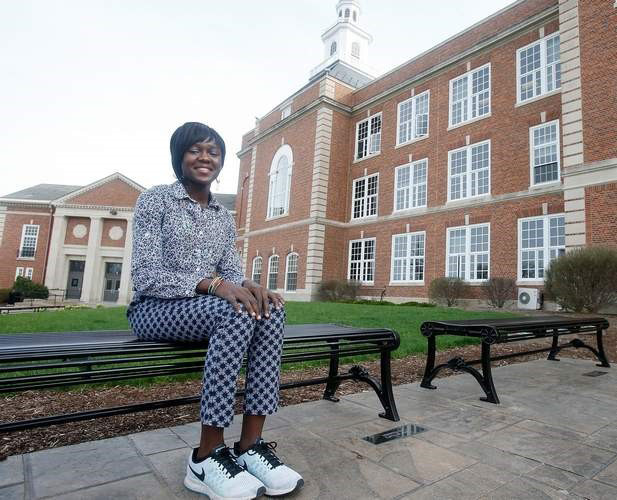Esther Bila reflects on Boko Haram kidnappings and her exchange experience
By Jess Reed, The Gazette

Esther Bila came to Iowa City from Gombe, Nigeria as an exchange student through the Iowa Resource for International Service (IRIS) shortly before her Nigerian school was attacked by the militant Islamist group Boko Haram. (Adam Wesley/The Gazette)
Nigerian student Esther Bila said she thought she was competing for a school trophy when she was asked to take a special exam.
However, she ended up earning a yearlong scholarship to study in the United States through the Kennedy Lugar Youth Exchange and Study Program.
The YES program, established in 2002 and funded through the State Department, provides scholarships for students from countries with significant Muslim populations.
Bila, 16, was placed in Hills through the Iowa Resource for International Service. She lives with host parents Norm and Bonnie Anderson.
“My host parents agreed to host me for a school year without even knowing me in person. I think that’s amazing — accepting a stranger into your home and treating her like your child,” Bila said. “It’s people like Norm and Bonnie Anderson that have given girls like me, from countries like mine, a reason to push forward and keep hoping.”
Just a few months after arriving in the United States in August, Bila’s high school in Gombe was attacked by the jihadist group Boko Haram.
Gombe residents had feared Boko Haram would strike, given the mass kidnappings of girls at the Chibok school last spring, Bila said. Gombe residents slept in their clothes on some nights in case they had to flee an attack.
“When I first came here, I wouldn’t let my host parents leave me alone at home thinking Boko Haram is here, too. They had to reassure me that it is safe, and no one is going to kill me,” Bila said.
Boko Haram remains active in Nigeria with the kidnapping of more than 400 women and children from Damasak in March and continued violent attacks on multiple towns.
“As a teenager, I don’t understand why schools will be a target for attacks, especially innocent girls looking for an education,” Bila said.
“Over 54 percent of Nigerian youths are unemployed. I think if youths had employment it would reduce the risk of (them) being radicalized.”
Now attending Iowa City High School, Bila is a member of the science club, school choir and the track and field team. Although she is taking senior-level courses, she still has more schooling ahead. Bila will return to Nigeria in June to finish her high school education.
“I love all of my classes; they’re fun and challenging. The teachers have been very supportive and helpful. Coming from a very different background of education, it was difficult to get into the system here, but they helped me through.”
Bila said she plans to study chemistry in the future.